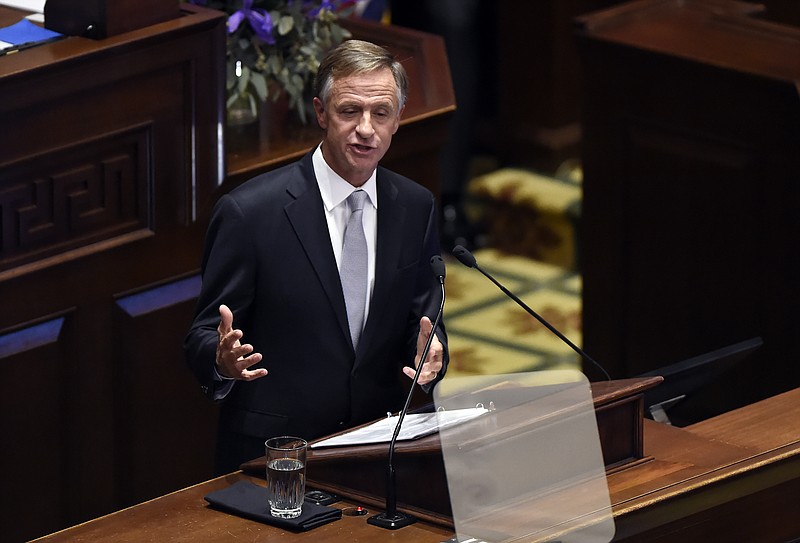NASHVILLE - Add Tennessee Gov. Bill Haslam to the list of elected Republican officials alarmed by President Donald Trump's plans to look at using national security laws to impose heavy tariffs on imported vehicles and parts.
"I'm concerned," the governor told reporters Friday after a Memorial Day ceremony in Nashville. "I do worry about that. There's no question that would mean cost increases for a lot of folks."
Tennessee is home to three major auto assembly plants - the Chattanooga-based Volkswagen facility, Smyrna-based Nissan and a General Motors plant in Spring Hill. Some components they use are imported.
The state-based auto manufacturers and suppliers have become an increasingly important part of Tennessee's economy. The state now has more than 135,000 workers in its overall automotive industry in 917 locations, blanketing 88 of the state's 95 counties, according to the state Department of Economic and Community Development's website.
Haslam said he is "one of those who believes in the free market, and I think we can hold our own. I think we're making cars here now that can compete with anybody in the world, and we're making cars here in Tennessee that can compete with anyone. I'm just not certain that using the national security reasons to put a tariff on cars is the right path."
In 2016 alone, workers here produced 832,600 cars, light trucks and SUVs. ECD says that in 2016, vehicles made in Tennessee accounted for 6.7 percent of all U.S.-made cars, light trucks and SUVs. Last year, Tennessee automotive exports hit $5.8 billion. Transportation equipment is the state's top export, accounting for 22.8 percent of total exports.
With statistics like that, U.S. Sen. Bob Corker, R-Tenn., rang the alarm bell Thursday, accusing Trump of abusing his authority to cite national security as an excuse to slap tariffs on foreign-made vehicles, as well as parts.
The administration is asking for up to 25 percent new duties on auto imports and is seeking to use a legal provision of the 1962 Trade Expansion Act related to national security.
"I am very concerned about the president abusing the authorities granted to him in Section 232 of the Trade Expansion Act of 1962," said Corker, chairman of the Senate Foreign Relations Committee, in a statement.
Corker said the move "appears to be either an attempt to affect domestic politics ahead of the election or for some other transactional purpose regarding ongoing trade discussions."
The senator and former Chattanooga mayor, who played a major role helping to persuade Volkswagen to locate its lone U.S. plant in Hamilton County, called the administration's action "a dangerous course [that] should be abandoned immediately."
U.S. Sen. Lamar Alexander, R-Tenn., who as governor in the 1970s and 1980s helped usher Tennessee into the auto-manufacturing age by helping lure Nissan here to build its Smyrna plant, said Thursday that one-third of Tennessee's manufacturing jobs are now auto-related.
"Tariffs on the imports of cars and auto parts will not put put our workers first by making it more expensive to build and sell cars here," Alexander warned. "They will destroy the thriving automotive industry that has been built by thousands of skilled Tennessee workers."
U.S. Rep. Chuck Fleischmann, R-Tenn., whose district includes the Volkswagen plant, said that "in the best interests of my constituents in East Tennessee, I hope that current automobile trade regulations are maintained."
The Ooltewah congressman said he has "always been a strong proponent of free trade and believe that the enforcement of this principle is one that drives the American economy and supports businesses and jobs across our nation."
In the 3rd Congressional District that he represents, Fleischmann said, "companies like Volkswagen employ countless hard-working Tennesseans, spur economic growth, and are committed to the betterment of local communities."
Tennessee exported $5.8 billion worth of vehicles or related products in 2017, a 59 percent jump from 2010.
More than 39,000 auto industry jobs were added from Jan. 11, 2011, when Haslam took office, to this March, the department says.
In 2016, Nissan's Smyrna, Tennessee-based plant was the most productive plant in North America, producing 645,514 cars, trucks and SUVs.
Contact staff writer Andy Sher at asher@timesfreepress.com or 615-255-0550.
